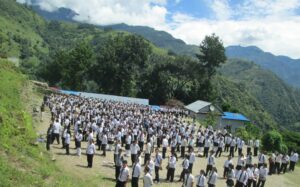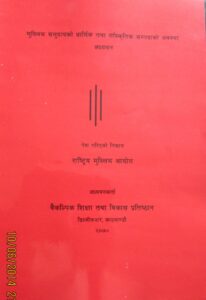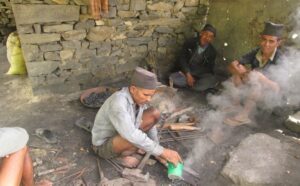Our Activities
Activities conducted by BSBP
Since its establishment, BSBP has undertaken various significant endeavors, including the assessment of programs and projects implemented by national and international organizations. Additionally, as part of our commitment to promoting quality education in remote areas of the country, we have conducted an ‘Action Research Project’ as an intervention measure in schools. Throughout our involvement in diverse projects, BSBP has actively engaged in both pure qualitative research and quantitative data analysis. This comprehensive approach has enabled us to prepare various types of profiles to gain valuable insights. The table below offers a synopsis of BSBP’s overall activities, covering the period from November 2013 to the present day.


Assessment of Tole Reading Group and EGR Sub-Committees
- Banke, Dhankuta, Dolpa, Kailali, Kaski
- Dec 20, 2019 - Apr 15, 2020
- Client : USAID/RTI
Our approach involves collecting qualitative information and complementing it with quantitative data sourced from ten schools across five districts of Nepal. By triangulating these different data sets, we strive to analyze the sustainability of the Tole Reading Group (TRG) and Early Grade Reading (EGR) Sub-Committee initiatives. Through this comprehensive assessment, a deeper understanding of the effectiveness and long-term viability of these programs was informed. |
Preparation of Dictionary
- Kathmandu
- Ongoing
- Client : BSBP
BSBP is currently engaged in the development of Learning Material with a focus on enhancing children’s learning and understanding of various subjects, such as indigenous foods, utensils, musical instruments, plants, and more. This initiative utilizes captivating visual illustrations and informal dialogues between children from diverse caste, ethnicity, culture, and geography backgrounds in Nepal. Our aim is to create an engaging and inclusive learning experience that promotes cultural awareness and fosters curiosity among children.
Development of Learning Materials
- Kathmandu
- Ongoing
- Client : BSBP
At present, BSBP is actively engaged in the development of learning materials that facilitate children’s understanding of indigenous foods, utensils, musical instruments, plants, and more. These materials employ visual illustrations and informal dialogues/conversations featuring children from various castes, ethnicities, cultures, and geographical backgrounds. The aim is to create an inclusive learning experience where children can explore and appreciate the diversity of their heritage, fostering a sense of cultural understanding and connection.
Preparation of Language Profile and the GIS mapping of Schools from 16 EGRP Focused Districts
- 16 Districts across Nepal
- July 2019
- Client : USAID/RTI
We conducted an analysis of the mother tongue status of students from a total of 778,281 individuals across 16 districts throughout the country. To present this valuable information in a visually engaging manner, we utilized Google Maps to plot the data points. As a result, we generated a comprehensive language report card, which serves as a valuable resource for Nepal’s donor community, National/International Organizations, and the Nepal’s Language Commission to inform their future initiatives and actions. |
Introduction of Mother Tongue Status in national education database
- Across Nepal
- June 2018
- Client : USAID/RTI
We implemented the integration of mother tongue status into the national educational database, enabling the Nepal Government to systematically collect and analyze information on students’ mother tongue. This significant step allows for a comprehensive understanding of students’ linguistic backgrounds. Furthermore, these data can be utilized to generate localized reports, such as the Local Level Education Report Card, providing valuable insights into the educational landscape at the grassroots level.
Joint Publication of Journal entitled Youth and Education
- Kathmandu
- 2016
- Client : Youth Advocacy Forum and Action-Aid
BSBP and its distinguished partner organization, Youth Advocacy Nepal, have collaborated to create the influential publication of a journal on the theme of “Youth and Education.” This compilation of thought-provoking articles addresses the major issues hindering the improvement of quality education in Nepal. Renowned scholars, educators, and experts contribute insightful pieces on topics such as access to education, inclusive practices, and teacher development. “Youth and Education” serves as a valuable resource for policymakers, researchers, and educators, promoting evidence-based practices and inspiring innovative solutions for transforming education in Nepal. This collaboration has resulted in a powerful platform for knowledge-sharing and addressing the challenges faced in sustaining quality education in the country.
End Line Study of 'Sabal Shikshya Dia' program
- Janakpur
- 2016
- Client : Aasaman Nepal
BSBP undertook an end-line study of the Sabal Shikshya Dia Project, aimed at assessing the program’s final outcomes and impact on the lives of girls and marginalized children in the Dhanusha district. This comprehensive study evaluated the effectiveness of the Sabal Shikshya Dia program and its contribution to empowering and transforming the lives of these vulnerable groups.
Mid Line Study on Sisters for Sister’s Education in Nepal
- Surkhet, Lamjung Dhading
- 2016
- Client : VSO Nepal/DFID
BSBP conducted a mid-line study on the Sisters for Sister’s Education in Nepal program to assess the perceptions of schools and communities regarding its impact. This study employed statistical evidence to evaluate the effectiveness of the program and gather insights into how it is perceived by key stakeholders. By examining the outcomes and perspectives, the study provides valuable information to enhance and optimize the Sisters for Sister’s Education Program.
Baseline Study of 'Sabal Shikshya Dia' program.
- Janakpur
- 2015
- Client : Aasaman Nepal
BSBP conducted a baseline study to capture the pre-project intervention situation of girls and marginalized children in the Dhanusha district. This study was undertaken prior to the implementation of the ‘Sabal Shikshya Diya’ program by Aasaman Nepal. The purpose of the study was to gather essential data and insights that would serve as a foundation for the program, enabling a comprehensive understanding of the needs and challenges faced by these vulnerable groups.
Effectiveness of Synthetic Phonics on Early Reading Skill
- Makwanpur
- 2015
- Client : VSO Nepal/DFID
BSBP undertook a final evaluation study of the VSO-implemented project titled “Jolly Phonics program” to assess its effectiveness in enhancing early reading skills. This comprehensive evaluation aimed to measure the overall impact of the program on the Early Grade Reading (EGR) students. By examining the outcomes and analyzing the data, BSBP assessed the extent to which the Synthetic Phonics approach, implemented through the Jolly Phonics program, contributed to improving the reading skills of EGR students. The findings of this study provide valuable insights into the efficacy of the program and offer recommendations for further enhancing early reading skills among students. |
Complementing Quality Education through Action Research
- Udayapur, Siraha
- 2014-2015
- Client : Action-Aid International Nepal
Complementing Quality Education through Action Research” is a project initiated by BSBP that focuses on fostering collaborative learning between BSBP and key stakeholders in schools. This project is designed to enhance the quality of education by integrating action research methodologies. By actively involving school stakeholders, including teachers, administrators, students, and parents, in the research process, the project aims to create a dynamic learning environment that promotes innovation, continuous improvement, and evidence-based practices.
Through this collaborative approach, BSBP and school stakeholders work together to identify and address educational challenges, explore effective teaching strategies, and develop solutions to improve student learning outcomes. By conducting action research, valuable insights are gained, enabling the implementation of targeted interventions and the refinement of educational practices.
The project “Complementing Quality Education through Action Research” serves as a platform for ongoing dialogue, professional development, and the exchange of best practices. By leveraging the expertise and experience of all stakeholders, the project strives to create a sustainable and transformative impact on the quality of education, benefiting both students and the wider educational community.
EGRA Report of Makwanpur District: Interpretation of the Field Data
- Makwanpur
- 2014
- Client : VSO Nepal
The EGRA Report of Makwanpur District presents the interpretation of field data that has been collected by VSO Nepal. This comprehensive study primarily focuses on the analysis of Early Grade Reading (EGR) students’ reading skills. The report examines various aspects such as sound knowledge, familiar word reading ability, invented word reading, reading comprehension, and listening comprehension. By analyzing the collected data, the report provides valuable insights into the reading proficiency of EGR students in Makwanpur District. It offers a comprehensive overview of the students’ reading abilities and highlights areas of strength and areas that require improvement. The findings of this report serve as a valuable resource for educators, policymakers, and stakeholders, enabling them to make informed decisions and develop targeted interventions to enhance reading skills among EGR students. Through the interpretation of the field data, this report contributes to the ongoing efforts to improve early grade reading outcomes and lays the foundation for evidence-based strategies and initiatives aimed at fostering a strong reading culture and promoting literacy development in Makwanpur District. |
Conditions of Muslim Religious and Cultural Heritages
- Nawalparasi, Rupandehi, Kapilvastu, Dang, Tanahun
- 2014
- Client : Nepal Muslim Commission
BSBP undertook a comprehensive documentation project focusing on the conditions of Muslim religious and cultural heritages. This initiative aimed to capture and preserve the diverse cultural treasures of the Muslim community, including art, skills, customs, traditions, and practices.
Through meticulous research and documentation, BSBP delved into the real disposition of these cultural heritages, shedding light on their significance, historical context, and current conditions. By capturing this valuable information, BSBP contributes to the preservation and promotion of Muslim cultural heritage, ensuring its recognition and appreciation.
The documentation project serves as a testament to the rich and vibrant cultural tapestry of the Muslim community, highlighting their unique contributions to the broader cultural landscape. It provides a platform for raising awareness, fostering cultural understanding, and promoting dialogue among different communities.
BSBP’s commitment to documenting and safeguarding the Muslim religious and cultural heritages reflects its dedication to preserving Nepal’s diverse cultural fabric and celebrating the rich heritage of all communities.

Baseline Verification Study of Sisters for Sisters' Education in Nepal
- Parsa and Lamjung
- 2014
- Client : VSO Nepal/DFID
The baseline verification study of Sisters for Sisters’ Education in Nepal conducted by BSBP aimed to shed light on the status of girls’ school attendance and learning performance, as well as parents’ and community attitudes towards their children’s education, and teachers’ skills in gender-sensitive teaching. This study focused on the districts of Parsa and Lamjung. Through rigorous data collection and analysis, the study provided valuable insights into the pre-project intervention situation. It examined the attendance patterns of girls in schools, assessing the factors that may influence their attendance and identifying barriers that hinder their access to education. Additionally, the study evaluated the learning performance of girls through the EGRA (Early Grade Reading Assessment) and EGMA (Early Grade Mathematics Assessment) tests, enabling a comprehensive understanding of their academic progress. Furthermore, the study explored parents’ and community attitudes towards their children’s learning, recognizing the importance of their support and involvement in educational initiatives. It also assessed the teachers’ skills in implementing gender-sensitive teaching practices, acknowledging the critical role they play in creating an inclusive and supportive learning environment. The findings of the baseline verification study serve as a crucial foundation for the project, providing a clear understanding of the existing challenges and opportunities. This knowledge allows for the development of targeted interventions and strategies to improve girls’ school attendance, enhance their learning outcomes, foster positive parental and community engagement, and equip teachers with the necessary skills to promote gender sensitivity in their teaching practices. |
Access to Education for Vulnerable and Marginalized Children in Karnali
- Kalikot, Dolpa
- 2014
- Client : KIRDARC-Nepal/European Union
BSBP conducted a comprehensive final evaluation study to assess the outcomes of the Access to Education for Vulnerable and Marginalized Children program in the Karnali region. This study examined key indicators such as enrollment rates, attendance, retention, and academic performance in 14 schools across Kalikot and Dolpa districts. The findings of the evaluation provide valuable insights into the effectiveness of the interventions and inform future planning for improving access to education for vulnerable and marginalized children. BSBP’s commitment to evidence-based approaches and collaboration with organizations like KIRDARC demonstrates its dedication to fostering positive change and creating sustainable solutions in the education sector of the Karnali region. |
Access to Education for Vulnerable and Marginalized Children in Karnali
- Jumla, Humla
- 2014
- Client : KIRDARC-Nepal/European Union
BSBP conducted a comprehensive study to evaluate the outcomes, prospects, and challenges of KIRDARC-Nepal’s Access to Education for Vulnerable and Marginalized Children in Karnali program. The study focused on assessing the program’s impact on vulnerable and marginalized children in the Karnali districts. By analyzing key indicators such as enrollment rates, attendance, retention, and academic performance, BSBP determined the effectiveness of the interventions and identified prospects for improving access to education in the region. The study also highlighted the challenges faced by the program in meeting the educational needs of marginalized children and provided recommendations for targeted strategies and interventions. The findings serve as a valuable resource for KIRDARC-Nepal and stakeholders, offering insights and recommendations to enhance the program’s effectiveness and sustainability. BSBP’s commitment to evidence-based approaches underscores its mission to improve education access for vulnerable and marginalized children in Karnali. |
Collaborative Study on School Governance in Kapilvastu
- Kapilbastu
- 2013
- Client : Save the Children
BSBP and Save the Children collaborated on a comprehensive study in Kapilvastu district, Nepal, focusing on the relationship between school governance practices and educational outcomes. Spanning across 40 schools, the study aimed to assess how factors such as decision-making processes, resource allocation, parental involvement, and community engagement impact the overall quality of education.
Through rigorous data collection and analysis, the study examined various aspects of school governance and their influence on student achievement, school attendance, and retention rates. The findings provided valuable insights for policymakers, education authorities, and school communities, highlighting effective governance practices that contribute to positive educational outcomes while identifying areas for improvement.
This collaborative study reflects a commitment to evidence-based research and driving positive change in the education sector. By understanding the connection between school governance and educational outcomes, stakeholders can work together to implement effective governance strategies that enhance the quality of education in Kapilvastu and beyond.

BSBP has achieved significant milestones through its diverse range of activities. Some of the major accomplishments include:
-
Conducting end line, mid line, and baseline studies for renowned organizations including Aasaman Nepal, VSO Nepal, KIRDARC Nepal, and Save The Children. These studies have provided essential data and evidence to evaluate program outcomes and effectiveness. The findings and recommendations have been instrumental in designing new plans and programs, ensuring continuous improvement in educational initiatives.
Assessing the sustainability of Tole Reading Group (TRG) and Early Grade Reading (EGR) Sub-Committees, providing valuable insights to USAID/RTI for determining their inclusion in the Early Grade Reading Program. This assessment has played a crucial role in shaping the program's future direction.
Developing a comprehensive Language Profile and GIS mapping of schools in 16 districts that are focused on the Early Grade Reading Program (EGRP). These resources provide a comprehensive overview of language groups and their distribution, facilitating informed decision-making. The language profile card and GIS maps have been integrated into the LG Education Report Card, enhancing its effectiveness.
Pioneering the introduction of Mother Tongue Status in the national education database. This initiative has enabled the collection and utilization of vital information about students' mother tongues, offering valuable insights for educational planning and other purposes. It has significantly contributed to data-driven decision-making in the education sector.
These accomplishments highlight BSBP's commitment to conducting rigorous studies, promoting evidence-based approaches, and driving positive change in the education sector. Through these activities, BSBP has played a significant role in shaping educational policies, enhancing program effectiveness, and ultimately improving the quality of education in Nepal.

